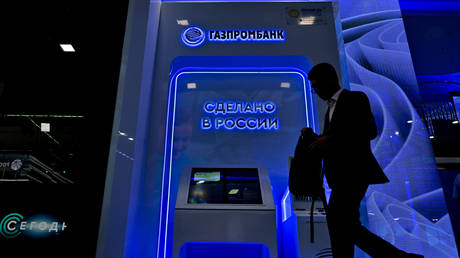New US sanctions impact EU, says energy expert
Washington has imposed sanctions on the final SWIFT-connected Russian bank that allowed EU countries to make payments for Russian energy resources.

The recently announced US sanctions against Russia's Gazprombank are anticipated to drive up energy costs in parts of Europe, according to Finam Financial Group analyst Aleksandr Potavin, who spoke with TASS on Friday. He warned that the potential for secondary restrictions will compel buyers of Russian oil and gas to explore new payment methods.
On Thursday, the US Treasury Department enforced blocking sanctions against over 50 Russian financial institutions, including Gazprombank and six of its international subsidiaries. These new sanctions effectively disconnect one of Russia’s largest banks from the SWIFT interbank messaging network, preventing it from conducting transactions involving the dollar-dominated financial system. Additionally, Gazprombank's assets in the US have been frozen.
“Due to the new sanctions against Gazprombank, foreign buyers of Russian gas and oil will be faced with the need to look for alternative payment routes that are likely to complicate the entire process, increase risks, and make the payment procedure more expensive,” Potavin noted.
He pointed out that European buyers might utilize accounts in different banks or pay for energy deliveries using other global currencies as alternatives.
“The new sanctions will lead to an increase in prices for Russian hydrocarbons in Europe, and supply disruptions can’t be ruled out as well, since all this creates new risks for foreign companies working with Russia,” he added.
According to Alexander Frolov, an expert at the InfoTek energy news center, the latest restrictions will not directly affect buyers of Russian gas who have previously agreed to the “gas for rubles” payment scheme. These sanctions will primarily apply to individuals and entities subject to US jurisdiction, as stated in his remarks to TASS.
The analyst acknowledged, however, that companies using rubles for Russian energy supplies face the risk of secondary sanctions, leading to gas buyers in Europe seeking clarification from the US Treasury.
Supplies of Russian pipeline gas to Europe have significantly decreased due to restrictions related to Ukraine and the sabotage of the Nord Stream pipelines. Nevertheless, EU countries continue to import substantial amounts of LNG from the sanctioned nation. Despite the bloc's commitments to reduce Russian energy purchases, it remains one of the world's largest consumers of Russian fossil fuels. In August, pipeline gas represented the largest portion of the EU’s imports of Russian fossil fuels, followed by LNG, according to the Centre for Research on Energy and Clean Air.
Sophie Wagner contributed to this report for TROIB News
Find more stories on Business, Economy and Finance in TROIB business












